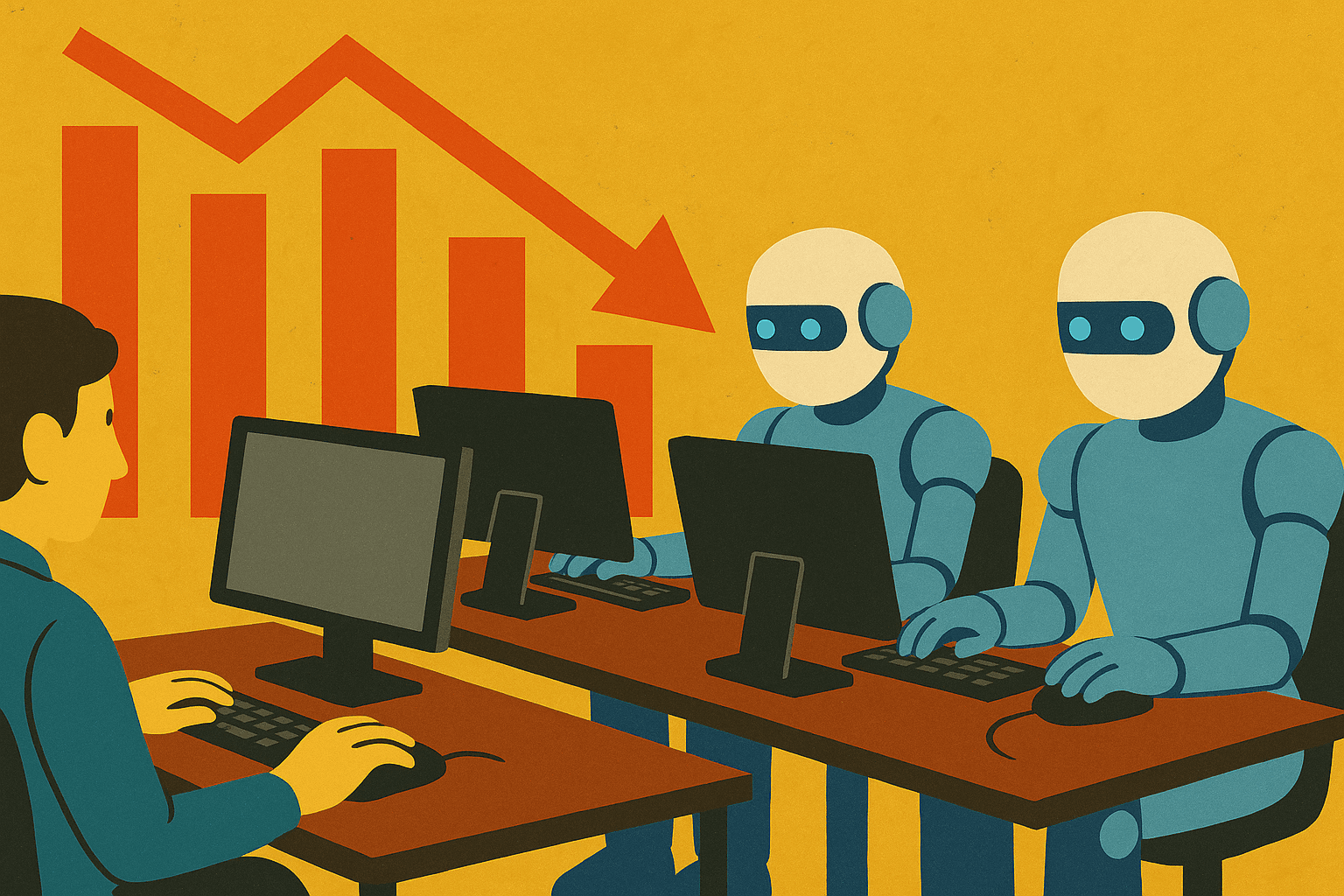Published August 26, 2025
I've been saying this for months on Twitter: AI isn't coming for jobs—it's already here. And it's not hitting everyone equally.
Today, Stanford economists released the first large-scale study proving what we all suspected but couldn't quantify.
Using payroll data from millions of workers, they found something stark:
Young workers in AI-exposed jobs have seen employment drop 13-20% since ChatGPT launched in late 2022.
Let me break down what this actually means.
The Numbers Don't Lie
Here's what happened to software developers aged 22-25 since late 2022:
- Employment down nearly 20% from peak
- Meanwhile, developers aged 35+ continued growing
Customer service reps? Same story. Marketing roles? Similar pattern.
But here's the kicker: this isn't happening in jobs that can't be automated.
Health aides, construction workers, nurses—young workers in these fields are actually growing faster than older workers.
The pattern is crystal clear: AI ate the entry-level jobs in knowledge work.

Why This Matters More Than You Think
Most people are focusing on the wrong thing. They're asking "Will AI replace all jobs?"
Wrong question.
The right question is: "If AI eliminates the work that teaches you how to do the work, how do you ever become an expert?"
Think about it. A 22-year-old developer used to learn by:
- Fixing bugs seniors didn't want to deal with
- Writing documentation
- Building simple features
- Debugging production issues
AI does all of that now. So how does that 22-year-old become the 35-year-old who still has a job?
The Experience Paradox
The study reveals something fascinating. They found that AI hits workers differently based on what kind of knowledge they have:
- Codified Knowledge (what you learn in school): AI crushes this
- Tacit Knowledge (what you learn on the job): AI can't touch this yet
Young workers primarily have codified knowledge. They know the syntax, the frameworks, the theory.
But they haven't developed the tacit knowledge—the intuition about what customers actually want, how to navigate office politics, when to break the rules.
Older workers have both. That's why they're protected.
But here's the problem: tacit knowledge comes from doing the work that AI now does.
The Automation vs. Augmentation Split
The Stanford researchers found something else important. Not all AI use destroys jobs.

- Jobs where AI automates work (replaces what humans do): Employment down
- Jobs where AI augments work (helps humans do more): Employment up
The difference matters. If you're building tools that make experienced workers 10x more productive, you're creating value.
If you're building tools that replace inexperienced workers completely, you're breaking the pipeline.
Most AI startups are building the second kind. They're optimizing for cost reduction, not capability enhancement.
Want the full playbook? I wrote a free 350+ page book on building without VC.
Read the free book·Online, free
What This Means for Founders
If you're building AI products, ask yourself:
- Are you helping experts do expert work faster?
- Or are you eliminating the work that creates experts?
The first creates sustainable value. The second creates a dead end.
What This Means for Workers
If you're early in your career, you can't compete on codified knowledge anymore. AI has that covered.
You need to focus on developing tacit knowledge faster than your competition:
- Work directly with customers
- Solve ambiguous problems
- Build relationships
- Learn to navigate uncertainty
Find roles where AI makes you better, not where AI makes you unnecessary.
The Bigger Picture
This study confirms something I've been thinking about: we're not in an "AI will change everything" moment. We're in an "AI already changed everything" moment.
The employment data shows the shift started in late 2022—exactly when ChatGPT went mainstream. The change isn't gradual. It's sharp, immediate, and ongoing.
And it's not evenly distributed. Young workers are canaries in the coal mine.
What Happens Next?
The researchers are tracking this data in real-time. We'll see whether:
- The trend accelerates (AI gets better faster than people adapt)
- The trend stabilizes (markets adjust, new entry-level work emerges)
- The trend reverses (regulation, backlash, or limits to AI capability)
My bet? It accelerates in knowledge work and stabilizes in everything else.
The question isn't whether AI will replace jobs. It's whether we'll develop new pathways from beginner to expert—or whether we'll create a generation of permanent juniors.
The Bottom Line
The data is clear: AI didn't just change the future of work. It changed the present of work.
Entry-level knowledge workers aren't competing with other humans anymore. They're competing with tools that never sleep, never ask for raises, and get better every month.
The workers who survive won't be the ones who compete with AI. They'll be the ones who use AI to do things that were impossible before.
The question is: are you building that future, or are you getting automated out of it?
What do you think? Are we seeing the end of traditional career ladders, or will new pathways emerge? Reply on Twitter or email me your thoughts.
George Pu is the founder of ANC and SimpleDirect, building AI-first businesses in Toronto. He writes about the intersection of technology and entrepreneurship at Founder Reality.
-1754757174784.jpg&w=128&q=75)
